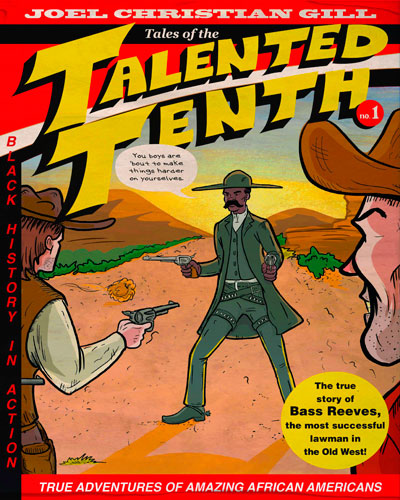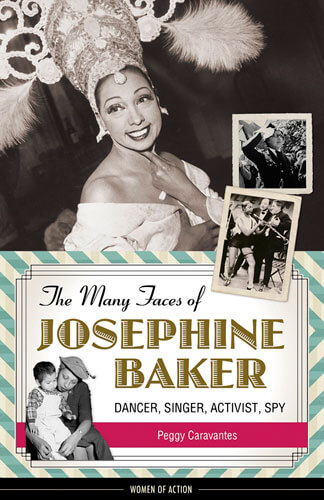“Bass Reeves: Tales of the Talented Tenth” by Joel Christian Gill
c.2014, Fulcrum Books
$25.95 / $32.50 Canada
126 pages
Everybody needs a hero in their life.
Somebody to look up to. Somebody to want to be like some day, to follow and admire – perhaps a parent, maybe a grandparent or uncle. A friend or classmate might be your hero, or maybe even someone you don’t know.
Or, as in the new book “Bass Reeves: Tales of the Talented Tenth” by Joel Christian Gill, your hero just might be a lawman.
George Reeves was a careful man.
His young slave boy, Bass, wanted to learn to read but Reeves “couldn’t have that,” so he taught Bass to shoot. Before long, the boy was one of the best sharpshooters Reeves had ever seen, and he decided to enter Bass in a few contests.
Nobody thought a slave could win a shooting match, but that’s exactly what Bass did – over and over again. As he grew, so did his talent with a gun but though Bass won every competition, Reeves still treated Bass like a “family pet.”
That continued for many years. Even during the Civil War, Colonel Reeves took Bass to the front with him as his personal slave – until Bass escaped.
Not knowing where he was, Bass ran until he was exhausted. He ran until he couldn’t run any more, until he was rescued from near-death by a tribe of Native Americans who tended Bass’s wounds and welcomed them into their village. They considered him family but Bass remembered how he’d been enslaved, so he left the village and returned to the battlefield, where he fought for the Union Army.
After the War was over, Bass married, started a family, and settled down to farm until, once again, duty called. Because Bass (who’d taken his former master’s surname) had a good relationship with the Native Americans in the Territories, he was hired to be a U.S. Marshal. It didn’t take long before he was deputized, and he began to make a name for himself. Word soon spread that a tall, black lawman was patrolling the territories and that, wherever he went, he left a silver dollar as a calling card. Bass Reeves was known to be smart, and he would do anything to bring a criminal down.
Even when that criminal was his own son.
Though its back-and-forth timeline can be confusing sometimes — particularly in latter pages — I liked “Bass Reeves: Tales of the Talented Tenth” quite a bit.
Based on little-known but true events, this is a story of action, honor, and the Wild West. That’s very good, but what equally appealed to me was the way author Joel Christian Gill uses his artist’s skills to tell this tale. The illustrations here are fully half the story; they entertain as they inform and they’re even a little sassy, with dark characters and icons as dialogue.
This is a book for teens or adults, including reluctant or struggling 12-to-17-year-olds for whom reading sometimes seems inaccessible. For them, or anyone who might like to try something different, “Bass Reeves: Tales of the Talented Tenth” is quite arresting.


























